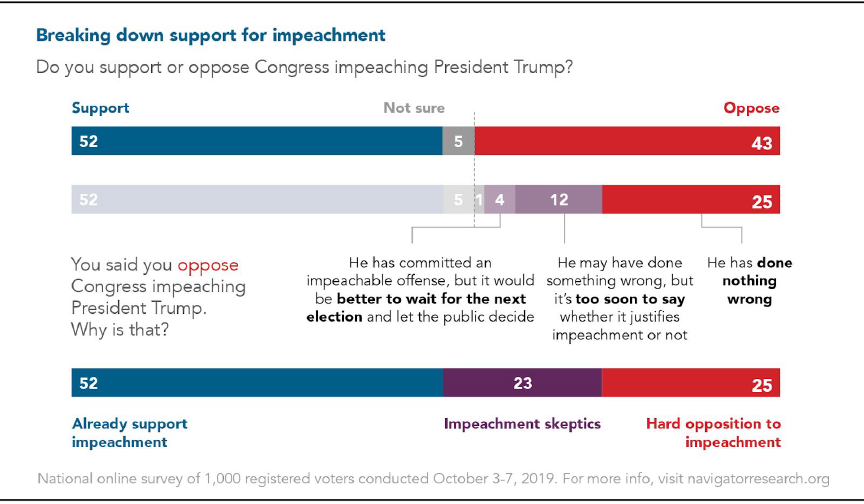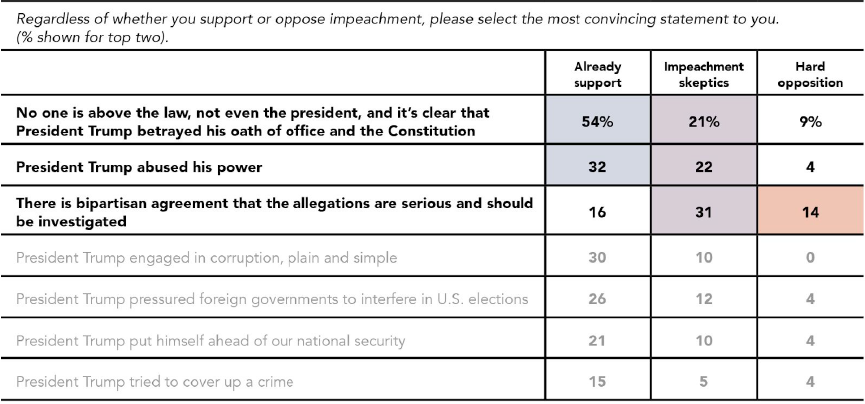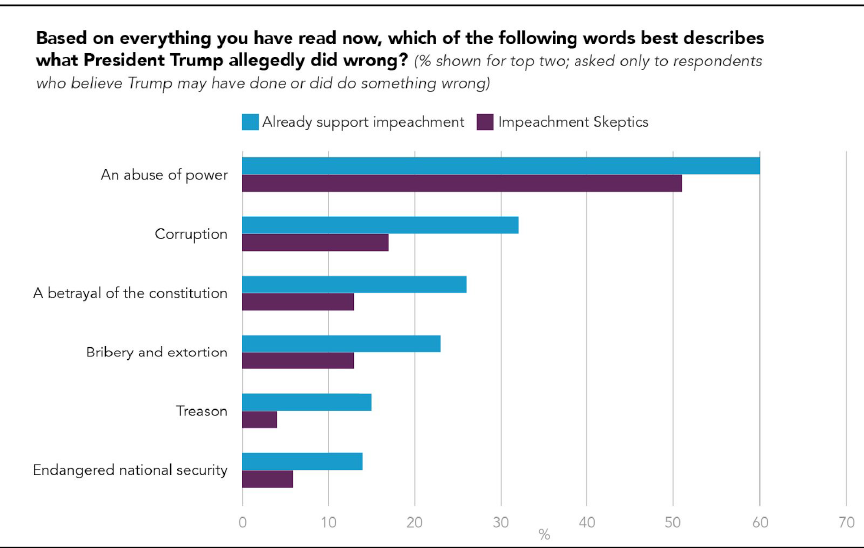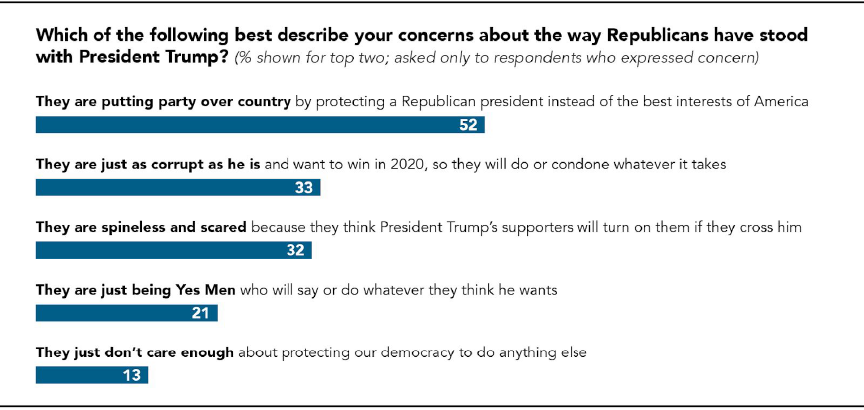Every month, we pick a few topics for exploration. The topics we select aren’t meant to cover every issue area facing the progressive community, but rather to give actionable advice on how to talk about key issue areas. In this volume, we focus on the impeachment inquiry underway in the House of Representatives.
Four key takeaways:
- A majority of Americans support the impeachment inquiry, impeaching President Trump, and removing Trump from office, but there are even more who are troubled by the allegations against him.
- The facts matter: advocates of the inquiry should shine a light on the core claims made in the whistleblower complaint – these are compelling to the public.
- Frame President Trump’s actions as an abuse of power, highlight that no one is above the law and amplify conservative voices who have agreed further investigation is justified.
- Argue that Republicans in Congress who oppose the inquiry are putting party over country.
Most Americans support impeachment. More can be convinced.
The latest Navigator Research poll finds support for House Democrats’ impeachment inquiry at 53%, with 42% opposed.
The inquiry and the underlying controversy have already received massive attention from the American people: 99% have heard something about the inquiry, including 72% who have heard “a lot” about it, and 63% who have heard “a lot” about the whistleblower complaint. For comparison, this level of awareness is much higher than the public release of the Mueller report (just 38% had heard “a lot” about the report’s release by early May).
Navigator not only asked about support for the impeachment inquiry, but also support for impeachment without any explanation, as well as whether supporters of impeachment supported Trump’s removal from office. This survey found almost complete convergence on each of these similar but distinct measures:
- 53% of Americans support the impeachment inquiry,
- 52% of Americans support impeaching Donald Trump, and,
- 51% of Americans support impeaching Donald Trump and removing him from the presidency.
Support for impeachment roughly mirrors approval of President Trump’s job performance, which is 44% approve, 54% disapprove in the survey. However, impeachment support is not limited to Democratic partisans. Among pure independents – those who don’t lean toward either party – 51% support the inquiry (and just 33% oppose), while 48% back impeachment. Among Republicans, 16% support the inquiry and 14% support impeachment.
Support for impeachment also extends to an oversample of nine states that voted for Trump by a 6-point margin collectively. Americans living there support the inquiry by 50% to 44%, and support impeachment 51% to 44%. However, support for removing Trump from office drops off in these states to 47% – slightly lower than the nation overall.
There is also evidence that public opinion could shift further against the president. Only 25% of Americans overall – about half of current impeachment opponents – believe Donald Trump truly “did nothing wrong.” That leaves roughly 23% of Americans who are “Impeachment Skeptics” – they oppose impeachment now, but they also are not ready to say Trump did nothing wrong. This group includes:
- 5% who are undecided about whether to impeach Trump;
- 12% who believe he may have done something wrong, but are not ready to say it justifies
impeachment; - 4% who oppose impeachment even though they believe Trump committed impeachable
offenses, but who would prefer to wait for the next election to let the public weigh in; - and 1% who did not offer a reasoning for opposing impeachment.

With Democrats overwhelmingly in the “already support” camp, the Skeptics are unsurprisingly right-leaning: 53% identify as Republicans, 21% as Democrats (26% are purely independent), and they approve of the president by two-to-one (62% approve, 31% disapprove). Yet, as described in the sections below, they seem likely to give the Ukraine allegations a hearing.
Beyond impeachment, Americans are concerned about Trump when it comes to corruption and the “rule of law.”
Americans do not trust Donald Trump when it comes to upholding the rule of law, and have more faith the Congressional Democrats running the impeachment inquiry will conduct proper oversight.
- The public trusts Democrats in Congress more than Trump on the issue of “rule of law” by a 14-point margin (49% to 35%).
- By 62% to 38%, Americans believe Trump “thinks he’s above the law.” The margin is 71% to 29% among independents and 54% to 46% among Impeachment Skeptics.
- By 60% to 40%, people believe Trump puts his own interests ahead of what’s best for the country.
Navigator has tracked one question over the past year asking whether Americans are more concerned that Democrats would “go too far” and use their oversight powers to attack the Trump administration – or that the Trump administration would get away with corruption and bad behavior.
- In November 2018, shortly after Democrats had taken the House majority, Americans were split 43% to 43% on this question.
- Today, they are more concerned about the Trump administration getting away with wrongdoing by a margin of 13 points (53% to 40%).
The facts are compelling, but Americans need to hear them.
Presenting the basic facts rapidly increases support for impeachment. When shown a key excerpt from the whistleblower complaint published on September 26th, fully seven in ten Americans (70%) say the material is at least somewhat concerning, including 50% who say it is “very concerning.” Among independents, 72% find the material very or somewhat concerning.
And “if the allegations are proven true,” support for impeachment jumps to 60%, with just 31% opposed.
Among the crucial group of Skeptics outlined in the section above – who don’t support impeachment, but who may be uneasy with Trump’s behavior – support for impeachment rises from 0% to 36%, with 40% opposed and 24% undecided. Sixty-one percent find the material concerning.
In a separate exercise, respondents were exposed to short factual statements regarding the broader Ukraine allegations. All of the facts shown are viewed as “probably true” or “definitely true” by a majority of the public:
- President Trump said, “I would like you to do us a favor though” before asking the Ukrainian President to investigate Joe Biden. (77% probably or definitely true)
- A whistleblower in the intelligence community believed President Trump may have broken the law. (75% probably or definitely true)
- Instead of a White House staff member who has gone through a background check, President Trump’s personal lawyer, Rudy Giuliani, traveled to Ukraine to push officials there to investigate Joe Biden. (70% probably or definitely true)
- Trump administration officials concealed a recording of the phone call with the Ukrainian President because they were afraid of the political consequences if the call became public. (65% probably or definitely true)
- The Trump administration purposely hid recordings of calls with foreign leaders of countries like Saudi Arabia and Russia because they were afraid of the political consequences if they became public. (64% probably or definitely true)
- Attorney General William Barr was involved and assisted in hiding the whistleblower complaint. (63% probably or definitely true)
- President Trump suspended military aid so he could pressure Ukraine to investigate one of his political rivals, Joe Biden. (60% probably or definitely true)
In addition, a majority also found each of these “troubling.” Among Skeptics, the most troubling statements were Trump suspending military aid to pressure Ukraine (55% found it troubling), the whistleblower believing a law was broken (55%), and Barr’s alleged involvement (53%). Notably, the “I would like you to do us a favor though” remark by Trump is not especially troubling among Skeptics (39%), so it likely needs the context of military aid used as leverage.
What respondents saw:
Below is an excerpt from the whistleblower complaint filed with the Inspector General of the intelligence community.
“In the course of my official duties, I have received information from multiple U.S. Government officials that the President of the United States is using the power of his office to solicit interference from a foreign country in the 2020 U.S. election. This interference includes, among other things, pressuring a foreign country to investigate one of the President’s main domestic political rivals.”
Emphasize that no one is above the law, Trump abused his power and there is bipartisan support for the inquiry.

A separate exercise provides clearer guidance on what aspects of the story are most compelling to the public: is it the national security aspect? The corrupt use of taxpayer money for personal gain? The assault on democracy? In fact, a range of arguments in favor of impeachment resonate with a large segment of the public – between 58% and 64% of Americans found each of the pro-impeachment arguments presented at least “somewhat” convincing.
In a forced choice, however, the two messages rising to the top either emphasize “no one is above the law” or that “Trump abused his power.”
Importantly, while “betrayed his oath of office” and “abused his power” rose to the top with those who already support impeachment, the “there is bipartisan agreement” argument was also particularly compelling for the Skeptics – a reality likely rooted in the conservative lean of the group. Emphasizing bipartisan support for the inquiry among leaders is an important way to expand bipartisan support for the inquiry among Americans.
In some cases, it may be necessary to distill the allegations even further, to a single phrase. Here, there is further clear guidance: call it an abuse of power. Among both supporters of impeachment and the unconvinced Skeptics, this is the most cited description of the alleged wrongdoing by far.

Remind Americans it’s Donald Trump who can’t see past impeachment.
There is a path for progressives who don’t want to be seen as solely focused on impeachment at the expense of other important issues: remind Americans it’s Donald Trump who stands in the way of getting things done on important issues, and he said himself he wouldn’t consider any new laws unless Democrats end their investigations.
In the survey, respondents were split into two groups, both of which heard a statement putting the onus on Democrats for focusing on impeachment instead of other issues. The half who heard a progressive rebuttal focusing on Donald Trump’s promise to be a roadblock sided with it by five points (43% to 38%). The other half heard a rebuttal focusing on Mitch McConnell’s refusal to hold votes on Democrats’ legislation, but progressives then lose the argument by three points (37% to 40%).
Democrats in Congress can put more faith in the popularity of party leadership than Republicans can. House Speaker Nancy Pelosi is now viewed favorably by 40% of the public, and unfavorably by 50%. But Senate Majority Leader Mitch McConnell is viewed favorably by just 25% and unfavorably by 48%. McConnell is weaker than Pelosi among independents (net -43 vs. -32 for Pelosi) but is also far less strong among Republicans (net +14) than Pelosi is among Democrats (+50).
Tell Republicans in Congress to stop putting party over country.
Even with public support for impeachment at 52%, a larger majority (61%) of Americans express concern about “the way Republicans have mostly stood by President Trump and opposed the impeachment inquiry.”
Of that 61%, most say the problem is they are “putting party over country” by protecting the president instead of America’s best interests

Addressing Republican hyperpartisanship is also an important step to inoculate impeachment supporters from the most potent anti-impeachment attacks.
When testing a series of arguments made against impeachment, none were “somewhat��� or “very” convincing for more than 52% of the public. However, the two messages that did hit 50% argued Democrats are “obsessed” and trying to “reverse the 2016 election” (50% very or somewhat convincing) or that impeachment would “tear the country apart” (52%). Notably, the “impeachment will tear the country apart” message is convincing to Democrats more than any other message, underscoring the importance of reminding Americans across the political spectrum this is happening because of Trump’s actions. Also important, Americans are much less persuaded by other arguments claiming the allegations are “false” or otherwise trying to spin the facts of the scandal.
This is why Republicans in Congress and their allies may likely try to make the debate into a process fight or a political fight about the 2016 election: when it’s an argument about the facts of President Trump’s behavior in the Ukraine scandal, they can’t defend it.

